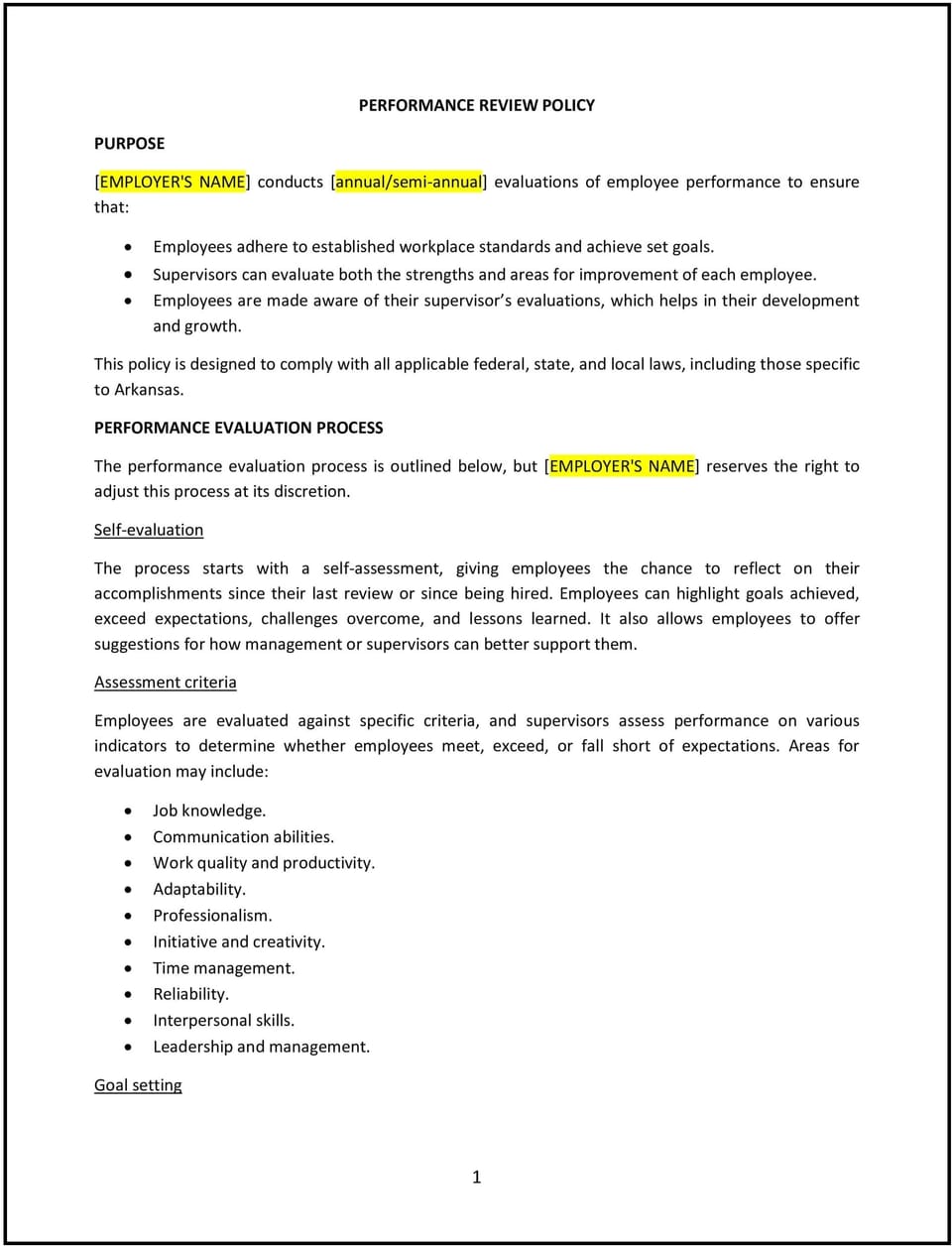Performance review policy (Arkansas): Free template

Performance review policy (Arkansas)
In Arkansas, a performance review policy provides businesses with a structured approach to evaluating employee performance. This policy establishes clear expectations, encourages professional growth, and helps businesses make informed decisions regarding promotions, raises, and development opportunities.
This policy outlines the frequency, criteria, and procedures for conducting performance reviews, ensuring consistency and fairness across the organization. By implementing this policy, Arkansas businesses can improve employee engagement, productivity, and alignment with organizational goals.
How to use this performance review policy (Arkansas)
- Define review frequency: Specify how often performance reviews will occur (e.g., annually, semi-annually, or quarterly).
- Establish evaluation criteria: Outline the key performance indicators (KPIs) and benchmarks used to assess employees’ performance.
- Set clear expectations: Communicate the purpose of the reviews and how they will impact decisions such as raises, promotions, or corrective actions.
- Provide feedback opportunities: Ensure the process includes both business feedback and employee input to foster open communication and professional growth.
- Document reviews: Maintain records of all performance evaluations to ensure transparency and accountability.
Benefits of using this performance review policy (Arkansas)
This policy offers several advantages for Arkansas businesses:
- Enhances employee engagement: Provides a platform for recognizing achievements and discussing areas for improvement, increasing motivation.
- Promotes fairness: Ensures a consistent evaluation process across all employees, reducing perceptions of favoritism or bias.
- Supports compliance: Aligns with Arkansas labor laws, ensuring performance evaluations are conducted fairly and lawfully.
- Improves decision-making: Helps the business make informed choices regarding promotions, compensation adjustments, and training needs.
- Fosters professional development: Encourages employees to focus on growth areas aligned with organizational goals.
Tips for using this performance review policy (Arkansas)
- Address Arkansas-specific considerations: Ensure the policy aligns with state labor laws and industry standards applicable in Arkansas.
- Train managers: Provide training on conducting objective and constructive performance reviews, including setting achievable goals and offering actionable feedback.
- Use standard forms: Develop uniform templates to evaluate all employees consistently and comprehensively.
- Encourage two-way communication: Create an environment where employees feel comfortable sharing feedback or concerns during reviews.
- Review regularly: Update the policy to reflect changes in business goals, workplace practices, or legal requirements.
Q: How does this policy benefit the business?
A: This policy ensures a consistent and objective performance evaluation process, supports compliance with employment laws, and helps identify areas for employee development and operational improvement.
Q: What should the business include in performance evaluations?
A: Evaluations should include assessments of key performance indicators, goal achievement, strengths, and areas for improvement, along with actionable recommendations.
Q: How does this policy support compliance with Arkansas labor laws?
A: The policy ensures evaluations are conducted fairly and objectively, minimizing legal risks related to discrimination or bias claims.
Q: What documentation should the business maintain after reviews?
A: The business should keep records of performance evaluations, feedback provided, and agreed-upon development plans to ensure accountability and transparency.
Q: How can the business use performance reviews to drive growth?
A: The business can identify high-performing employees for promotions, address skill gaps through training, and align individual goals with organizational objectives.
This article contains general legal information and does not contain legal advice. Cobrief is not a law firm or a substitute for an attorney or law firm. The law is complex and changes often. For legal advice, please ask a lawyer.


